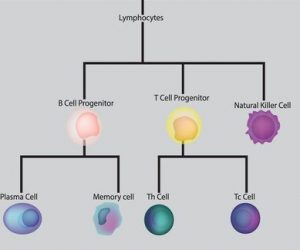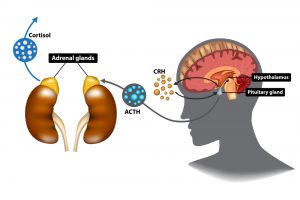Chronic Stress, Your Immune System & Response to the Coronavirus

While our bodies are adapted to handle short term stressors, they are not equipped for the chronic stress so many Americans endure.
Once you are used to chronic stress, it can be hard to get out of the habit. We often feel that we can’t, that we have too many people to please and obligations to fulfill. But being chronically stressed is not sustainable.
Chronic stress makes us more irritable, makes it harder for us to relax, and increases our risk of almost every disease, including infectious diseases.
And now with a lurking deadly virus, this is a great time to prioritize our immunity to build resilience!
Below are 3 compelling ways chronic stress weakens our ability to fight pathogens, and especially the Coronavirus.
My mission is not to scare you out of your wits, but to scare you into your wits. Revisiting these has helped compel me to make lowering my stress an important priority, and I hope it will do the same for you.
Plus at the end, I’ll reveal my favorite stress relieving strategy which you don’t want to miss.
Top 3 ways chronic stress affects our immunity and susceptibility to the Coronavirus:
1. Stress decreases the proliferation of lymphoctyes
 Your lymphocytes are your white blood cells that fight off pathogens (viruses, bacteria, etc.) Ideally when your body encounters an invader like a virus, your white blood cells should proliferate so that you are better able to destroy it. With chronic stress, you have more circulating cortisol, and this prevents the proliferation of your lymphocytes. Without enough lymphocytes the virus can invade your cells, divide and multiply without repercussions.
Your lymphocytes are your white blood cells that fight off pathogens (viruses, bacteria, etc.) Ideally when your body encounters an invader like a virus, your white blood cells should proliferate so that you are better able to destroy it. With chronic stress, you have more circulating cortisol, and this prevents the proliferation of your lymphocytes. Without enough lymphocytes the virus can invade your cells, divide and multiply without repercussions.
2. Chronic stress inhibits our ability to keep inflammation in check
We have a system called the hypothalamic pituitary axis (HPA axis). that regulates stress hormones, such as glucocorticoids like cortisol. These hormones also help us regulate inflammation so that it doesn’t get too high.
Once infected with the Coronavirus, people have a wide variety of responses. Some have no or mild symptoms, some get very sick and others die. The key difference that makes the Coronavirus deadly in some, is the activation of the cytokine storm (unchecked inflammation). The cytokine storm can lead to multiple organ failure as an unchecked immune system attacks everything in site.
Glucocorticoids usually help keep inflammation within reasonable limits, but if the HPA axis is damaged by chronic stress, it can’t secrete enough glucocorticoids. The person with chronic stress is thus more vulnerable to a cytokine storm.
Thus chronic stress creates more inflammation and makes it harder for us to keep it in check.
3. Inflammation from chronic stress feeds the oxidative damage-inflammation loop
Inflammation exacerbates oxidative damage. This means that there are unpaired electrons running around trying to steal electrons from anything and everything it can. The oxidative damage in turn, is pro-inflammatory.
Oxidative damage and inflammation age us. They damage healthy cells, tissues and organs. They are major contributors to all chronic diseases, including autoimmune diseases, and heart disease. And they can damage our lungs and our blood vessels. All of these conditions increase our vulnerability to losing the battle against SARS-CoV.
So as you can see, chronic stress is incredibly damaging to our bodies and our brains, and when there is a pandemic like the Coronavirus, it is ESSENTIAL that we do what we can to mitigate it!
So what can we do about chronic stress?
How we respond to stress depends on both our past (through our lifelong experiences and inherted tendencies), and our current lifestyle.
If you’ve experienced a lot of trauma, whether it’s from relationships, finances, work stress or health issues, it’s important to do what you can to address these issues! Using effective methods, like the Body Code, we can, and should change our response to stress!
However our lifestyle choices matter too. Practicing yoga, meditation, exercise, being in nature, connecting with loved ones. are important to do. It’s also so important to surround ourselves with people that support us, and to have a balanced lifestyle.
I recognize that is often easier said than done!
Train your Parasympathetic Nervous to Calm the Heck Down!
 One of the best ways to help manage your current day stress is to train your Parasympathetic Nervous System (rest and digest) to have control over your Sympathetic Nervous System (fight or flight).
One of the best ways to help manage your current day stress is to train your Parasympathetic Nervous System (rest and digest) to have control over your Sympathetic Nervous System (fight or flight).
You can do this by practicing deep relaxation techniques. The key is that you want to be horizontal, and focus on relaxing. You can do this by getting a massage, doing progressive muscle relaxation, or yoga nidra. Do this for at least 20 min 2-3x /week (depending on need). While this can help you fall asleep at night, you also want to practice during the day.
If you have a lot of chronic health problems or stress issues, a practice of deep relaxation should help, but may not be sufficient. You might have imbalances in your HPA axis, belief systems or lifestyle habits or an environment that may need to be addressed. If you’ve struggled with long term stress or difficulty sleeping, now with the Coronavirus pandemic, is the time to address it! As a Holistic Brain Health Practitioner, I release imbalances that contribute to these conditions. Learn more about what I do here, and contact me for a non-sleazy complimentary consultation.



